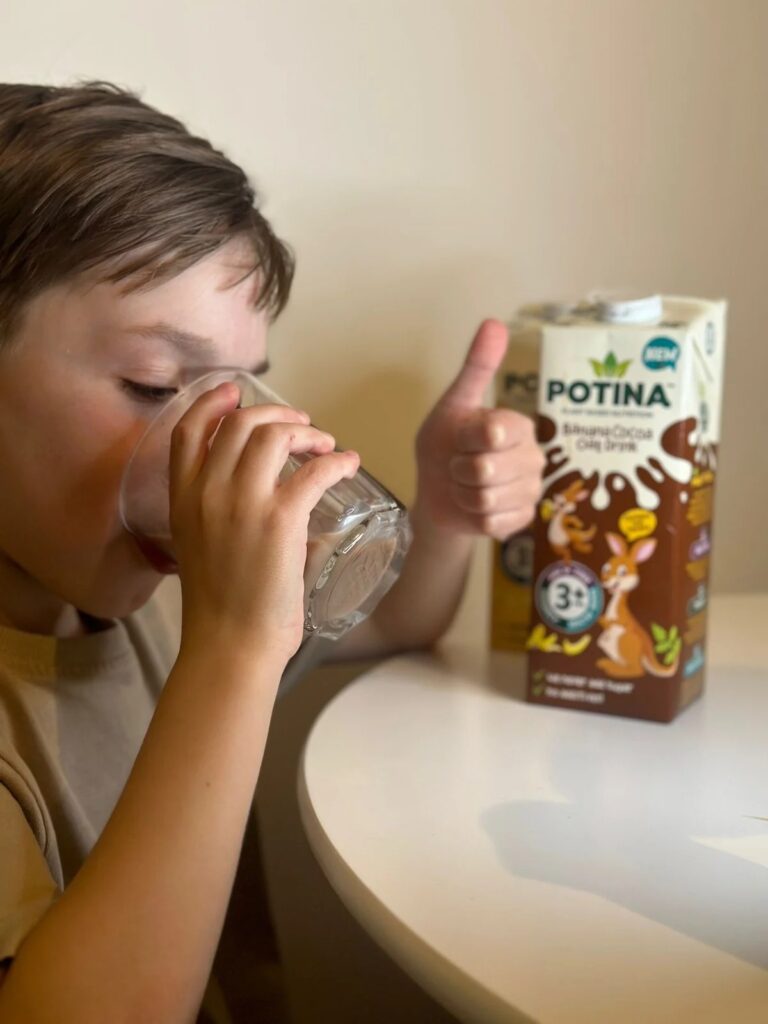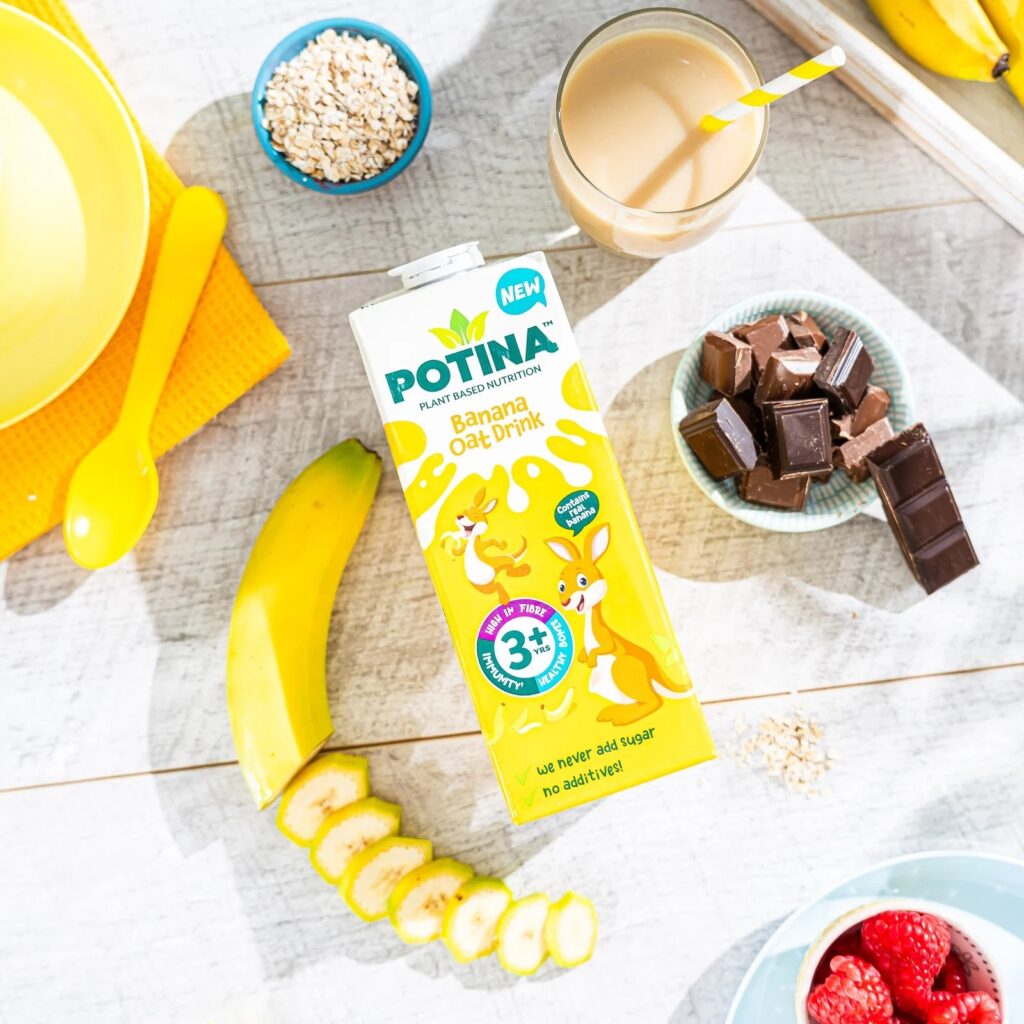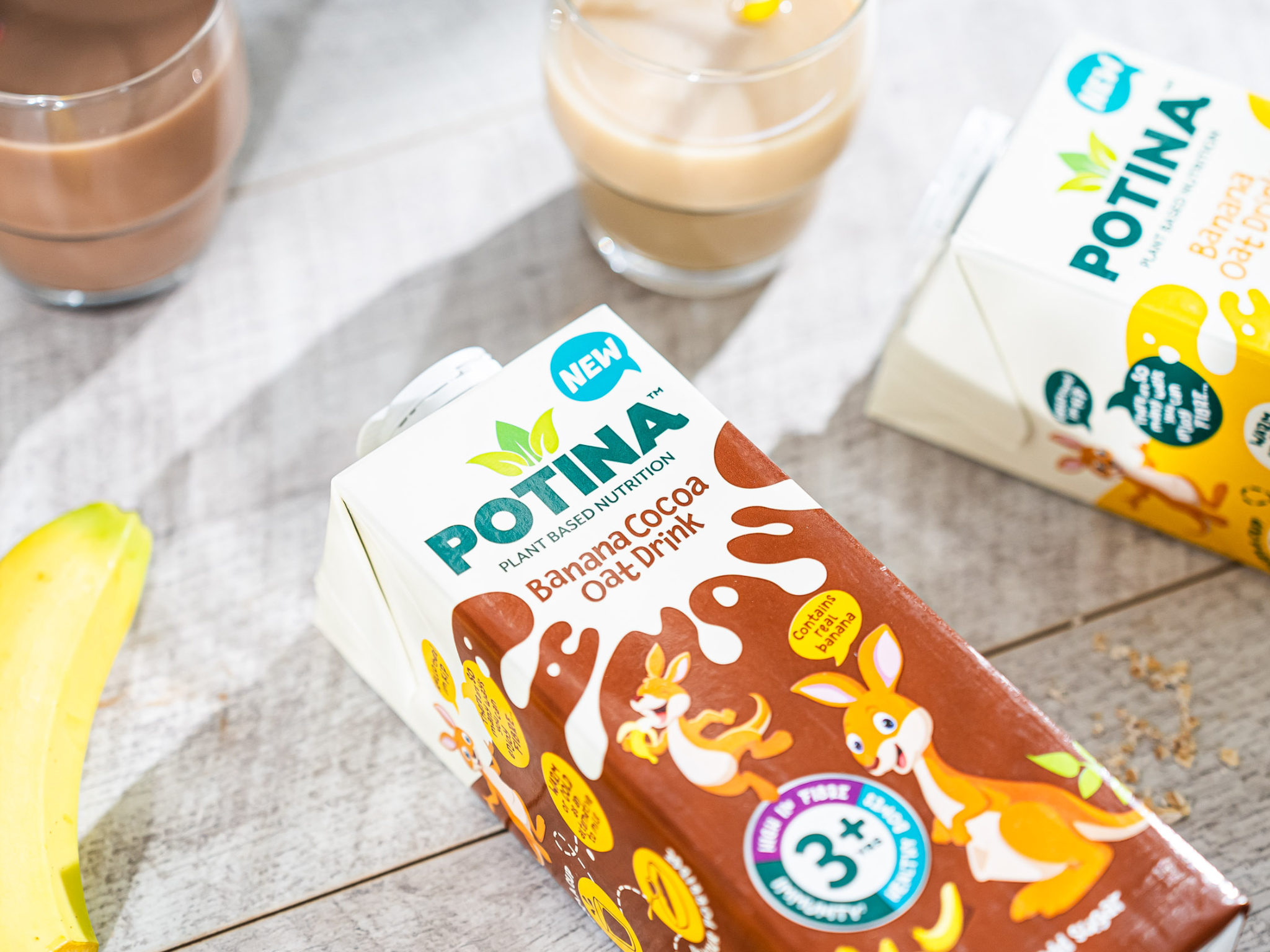As UK Embraces Gut Health, A New Oat Milk Brand Targets High-Fibre Nutrition for Kids
5 Mins Read
Amid the rise of gut health and GLP-1 drugs in the UK, Potina is making high-fibre banana oat milks for improved children’s nutrition.
As the UK pushes back against junk food advertising and begins embracing GLP-1 drugs to combat the obesity epidemic, a new plant-based milk brand is hoping to deliver on the demand for clean-label, high-fibre nutrition.
Established by Adam Womersley, who was previously the commercial sales director at Alpro UK, Potina is aiming to shake up the alt-milk sector with a two-strong lineup of banana oat milks that contain three main ingredients – water, oats and banana pulp – alongside fibre and fortification sources of calcium and vitamins D and B12.
“Parents struggle to steer clear of added sugars, additives, and empty calories when choosing drinks for their children,” said Womersley. “As parents, we want better choices that offer both nutrition and taste without compromise.”
A focus on resolving children’s health risks in the UK

The Potina oat milks come in original and chocolate flavours, and contain 2g of fibre per 100ml. The company is keen to emphasise what they don’t contain: added sugars, sweeteners, oils, emulsifiers, stabilisers, or flavourings.
Data cited by the brand reveals that 65% of toddlers drink a can of an artificially sweetened soft drink every day. In fact, ultra-processed foods contribute up to 80% of children’s diets in the UK, and around two-thirds of calories consumed by adolescent Brits.
The UK is currently experiencing an obesity epidemic – two in three adults are already overweight or obese, but so are a third of its children. A similar number of kids are at risk of developing a food-related illness in the future. Meanwhile, 95% are exceeding the daily recommended amount of sugar, and 66% are doing so for salt.
Food companies are complicit in this, with seven of the 10 largest food and drink manufacturers in the UK making over two-thirds of their profits from the sale of unhealthy products presented in packaging designed to appeal to kids.
It’s why the Labour government has introduced a ban on junk food ads on TV before 9pm and the sale of energy drinks to people under 16, which will come into effect in October 2025.
“I’ve always been passionate about healthy eating. After years working with top food brands and the NHS, I saw firsthand how good nutrition can change lives,” said Womersley.
With Potina, he is hoping to respond to the demand for clean-label plant-based options – 8% of British children were vegan as of 2021, with another 15% wanting to follow the diet – through oats and bananas. You may be familiar with banana-flavoured milk, but the brand is the first in the UK to blend banana pulp into plant-based milk (joining US compatriots Mooala and Almond Breeze).
Potina says it specifically chose bananas for their natural sweetness and nutrient profile, and to provide a balanced energy source.
“We want to make it super easy for families to make small, simple swaps towards a plant-forward diet,” said Womersley. “As a dad of two young children, I appreciate firsthand how much families want easy, nutritious options that support their kids’ health.”
Potina tackles fibre deficiency and gut health

Potina is also tackling a major problem for the UK: fibre deficiency. No age group meets the national daily recommended intake of this essential micronutrient, according to government figures. Among children, only 12% of those aged 1.5 to three consume enough fibre, which rises to 14% for ages four to 10, and drops to just 4% for adolescents aged 11 to 18.
It uses soluble corn fibre and citrus fibre to amp up the fibre content of its milks, while also providing 15% of the daily recommended values of calcium, vitamin B12, and vitamin D2. Plus, there’s only 0.5g of fat per 100ml (with only 0.1g being saturated fat). And although the protein content is low (0.5g), young children in the UK are already exceeding the recommended intake of this nutrient.
Potina’s fibre focus also speaks to the growing awareness around gut health in the UK. Over half (55%) of Brits are more acutely aware of their gut health this year, with documentaries like Netflix’s Hack Your Health and personalised nutrition apps like Zoe educating viewers about the importance of the gut microbiome.
That said, over a third (34%) of the UK population doesn’t know what proactive gut health measures to take – consuming more fibre is one way to do this. “Our mission is to make getting enough fibre easy, fun, and fuss-free,” Womersley said.
Dietary fibre also regulates incretin, a hormone that boosts the GLP-1 receptor in our bodies. As GLP-1 agonist drugs like Ozempic, Wegovy and Mounjaro take over the US for their appetite-control and weight-loss attributes, food companies have been pushing fibre-forward products to take on the rise of these medications. And just last month, the UK announced a five-year trial for weight-loss drugs to combat unemployment with Eli Lilly, the US-based manufacturer of Mounjaro.
At the same time, there’s an increased focus on kids’ nutrition among plant-based brands globally. In the last few months alone, Koia launched three oat milkshakes for kids, Little Spoon partnered with Oatly to introduce overnight oat smoothies for children, and Califia Farms brought out its Complete Kids Plantmilk.
While these developments took place in the US, closer to home in the UK, Deliciously Ella has established a kid-focused offshoot with two Oaty Bars to start, fresh from its acquisition by Hero Group. Now, Potina is joining the maturing category for children’s plant-based milk, joining competitors in the UK like Alpro’s Growing Up range, Koko Dairy Free’s Kids Free From M!lk, and Nestlé-owned SMA Nutrition’s Little Steps Plantygrow milk.



